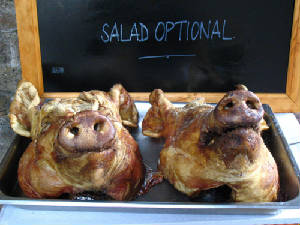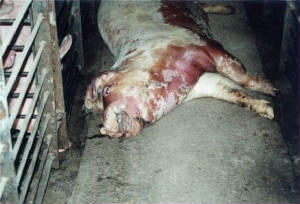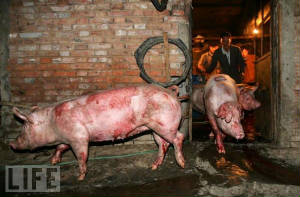|

Pigs
In the September 1976 issue of the industry journal
Hog Farm Management, John Byrnes advised: “Forget the pig is an animal. Treat
him just like a machine in a factory.”
Today’s pig farmers have done just that.
As Morley Safer related on 60 Minutes: “This [motion picture Babe] is the way America’s want to think of pigs. Real-life ‘Babes’ see no sun in their limited
lives, with no hay to lie on, no mud to roll in. The sows live in tiny cages, so narrow they can’t even turn around.
They live over metal grates, and their waste is pushed through slats beneath them and flushed into huge pits.”
“Hogs,
unlike cattle, are dunked in tanks of hot water after they are stunned to soften the hides for skinnig. As a result, o botched
slaughter condemns some hogs to being scalded and drowned. Secret videotape from an Iowa pork plant shows hogs squealing and
kicking as they are being lowered into the water.”

Not Your Childhood
Image
When
I saw what life is really like for pigs on today’s farms, I was left feeling physically sick for days. I suppose I knew
they lived on concrete, indoors in factory farms. However, I was not prepared for the intensity of their confinement, and
the awful reality of their bedroom.
In the gestation shed, I heard a constant clanging
noise. It was the sows hitting their heads against their cage doors as if trying to escape. After a while, some would give
up and lie down, while others again took up their futile action.
I saw the pens where pigs are fattened up for
slaughter – essentially concrete cells, each holding about a dozen pigs. In one pen, there was a pig missing an ear.
Another had a rupture the size of a grapefruit protruding from his stomach. A dead pig was constantly nudged and licked by
others. The stench in these places is overwhelming.
At the larger farms I visited in North Carolina,
there were thousands of pigs housed in sheds. Many were dead or dying – one actually died right in front of me as I
videotaped. Dead pigs had been left in the pens with the living; other pigs had been tossed in the isles – barely alive,
unable to reach food or water.

|
